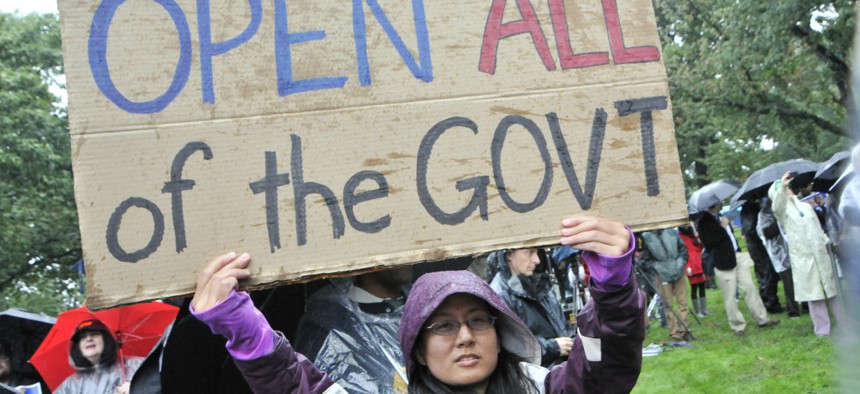
Workers protest during the October 2013 shutdown. AFGE file photo
A Primer on Federal Pay and Benefits In Case the Government Shuts Down Again
Keep in mind that Congress has always approved back pay for federal workers furloughed during shutdowns.
The government will close on Oct. 1 for the second time in two years if Congress doesn’t pass a short-term funding measure by next Wednesday. So as that deadline looms, we thought a refresher on how shutdowns affect federal employees’ pay and benefits would be useful.
The fights over federal funding for Planned Parenthood is this year’s wedge issue upending government spending discussions. Lawmakers and others are hopeful that the Senate will produce a short-term continuing resolution that the House will then take up in time to avoid a lapse in appropriations. But that’s iffy at this point. “I can’t stand here and say with confidence that there won’t be a government shutdown despite all our efforts to avoid a government shutdown,” said Rep. Chris Van Hollen, D-Md., the House Budget Committee’s top Democrat, on Tuesday.
Federal agencies are preparing for a possible shutdown. On Monday, the Office of Management and Budget held a call with agency leaders to discuss a possible closure, and their plans for executing an orderly shutdown. “We are now in a situation where we may need” to implement the plans, OMB spokeswoman Emily Cain said.
In the event we have a repeat of October 2013, when much of the government was shuttered for 16 days, here’s what federal workers should keep in mind regarding their pay and benefits:
Salaries: Agencies must pay excepted and exempted employees for the days they work during a shutdown, though they won’t see that pay until after the shutdown ends. If you’re furloughed during a shutdown, there is no guarantee you will be paid, since it’s up to Congress. However, Congress has always approved back pay for federal workers furloughed during shutdowns. Lawmakers in both chambers already have introduced bills that would give furloughed feds back pay as soon as the government reopens in the event of a 2015 shutdown.
Bonuses: Agencies can give out performance awards during a shutdown, which will be paid to employees when funds are available.
Unemployment Compensation: Furloughed federal workers could be eligible for unemployment compensation, depending on where they live. In 2013 however, many federal workers who received unemployment compensation had to pay it back when Congress approved retroactive pay after the shutdown ended.
Health care: Furloughed employees are still covered under the Federal Employees Health Benefits Program during a shutdown. As for employees’ biweekly FEHBP contributions to their premiums, that will accumulate during the shutdown and be deducted from their pay when they return to work. Employees cannot temporarily halt their FEHBP enrollment while in non-pay status. As for the Federal Employees Dental and Vision Insurance Program, workers furloughed for two consecutive pay periods will receive a bill in the mail for their FEDVIP coverage and will have to pay it if they want to keep their insurance.
Retirement benefits: Retirees in both the Civil Service Retirement System and the Federal Employees Retirement System will receive their annuity benefits during a shutdown. Furloughed employees enrolled in the Thrift Savings Plan will not contribute to their accounts during their nonpay status and their agency contributions will stop during that time. Once the shutdown is over and funds are available, contributions will resume and employees will receive retroactive benefits. Click here for TSP’s guidance during a government shutdown.
Leave: Employees cannot use paid leave instead of taking an unpaid furlough day during a government shutdown. Previously scheduled sick or annual leave days will be canceled if the government closes.
Click here to read (re-read) the full government shutdown guidance on federal pay and benefits from the Office of Personnel Management published in October 2013.







